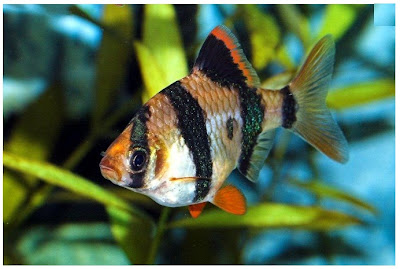Scientific
Name: Puntius tetrazona.
Common Names: Tiger Barb, Sumatra Barb, Green and Albino, Partbelt Barb.
INTRODUCTION
The Tiger
Barb is a great choice for beginner hobbyists! It has black bands that run
vertically with a gold/orange body. The Tiger Barb also has different varieties
like the Green or Albino Tiger Barb.
Although
the Tiger Barb is great for beginners you must be careful with what its tank
mates will be. It is a very active tropical fish that is known as a fin nipper.
They can startle slow moving fish and nip at long finned fish like Bettas. To
reduce this effect, make sure to have a school of Tiger Barbs so they are more
comfortable in the aquarium. Make sure to have at least 6 together and house
them in no less than a 20 gallon fish tank.
The Tiger
Barb isn’t too picky when it comes to water quality. Just make sure to have a
heater in your tank because they are a tropical fish that requires water warmer
than room temperature. When feeding, they will accept flake foods, frozen
foods, and brine shrimp or krill.
Feeding
Tiger Barbs eat practically anything - they are not fussy eaters at all.
They will eat flake food, algae wafers as well as live and frozen treats such
as bloodworms, water fleas and brine shrimps.
Note that Tiger Barbs do get very active when food is added to the tank, so
they may not be suitable tankmates with fish that like to take their time over
their food. To ensure that everyone gets their fair share, it may be worthwhile
scheduling some feeding times for during the night, when Tiger Barbs are much
less active.
Behaviour
Tiger Barbs are busy fish! I think they are the busiest fish ever.
Like many shoaling fish, Tiger Barbs establish a definite pecking-order
within the shoal. Periodically a couple of the fish will have a fight to
challenge for a position in the pecking order. Each fight continues for several
minutes, during which they encircle each other and try to nip each other's
fins:
After pecking order is re-established, the fish seem to get on pretty well
again after that.
Sexing Tiger Barbs is quite straightforward. The males have bright orange
noses and their fins may be a stronger orange colour. Note that the fish do
often look different colours according to the lighting and also the mood of the
fish!
Natural Habitat: Indonesia,
Sumatra, and Borneo
Adult Size: 3 inches.
Life Span: 5-6 years.
Tank Mates: They are fin nippers so do not keep with long finned fish like fancy guppies and bettas.
Adult Size: 3 inches.
Life Span: 5-6 years.
Tank Mates: They are fin nippers so do not keep with long finned fish like fancy guppies and bettas.
Tank Size: 20 gallon or larger.
Tank Region: Middle.
Water Temperature: 68–79 °F (20–26 °C)
Water pH: 6 – 7.5
SEX: Male may have more color and show red on its nose, Females are rounder because they carry eggs
Origin:
Sumatra and Borneo.
Behavior: Peaceful and active in groups of 6 or more,
otherwise very nippy in smaller groupS.
Notes
One of the most active community fish, the tiger
barb features distinct black stripes on its diamond shaped body. The
many varieties of Tiger Barbs include the Green and Albino
variety. The Tiger Barb is best kept in groups of 6 or more,
or it will furiously nip the fins of other fish. The long, swaying fins of the
Angelfish are especially vulnerable to be nipped off from Tiger Barbs.
I believe that Tiger Barbs are more active in larger groups,
too. A tank full of a community of Tiger Barbs can create an
exotic display by themselves
.








We have many high quality flowerhorn fish for sale at www.thaiFH.com
ReplyDeleteAlso supply for flowerhorn wholesale.
Please feel free to contact us at support@thaifh.com